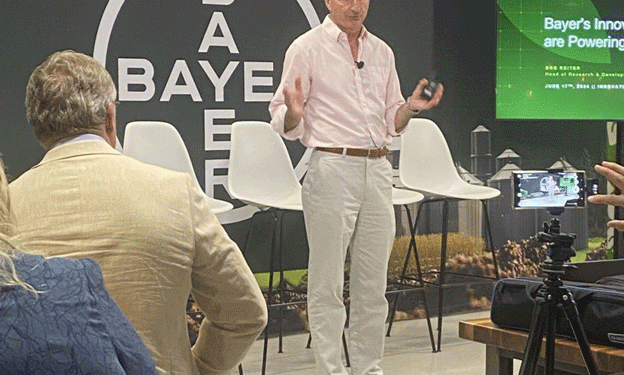Bayer made a compelling case this week that it stands at the forefront of increasing farm production to feed a growing global population while drastically reducing carbon emissions. At the Regenerative Crop Systems for a Changing Planet event in Chicago, Bayer executives showcased a suite of innovative products designed to protect crops from pests and environmental stressors. Among these, Bayer announced 10 new “blockbusters” over the next decade, each projected to generate over 500 million euros ($537 million) annually in sales.
Innovations to Transform Agriculture
A centerpiece of Bayer’s presentation was Preceon, a revolutionary short-stature corn variety. Preceon’s deep root system enhances carbon sequestration and resilience to high winds, while still delivering robust yields. Bayer predicts Preceon will revolutionize global corn production, estimating its peak sales potential at over $1.6 billion. In its initial soft launch across 35,000 acres in the U.S., Preceon has already demonstrated yields comparable to traditional tall corn varieties, with added benefits of easier field access for late-season nitrogen application.
Financial and Legal Hurdles
Bayer’s ambitious plans come as the company works to stabilize financially after acquiring Monsanto for $63 billion in 2016. The merger has faced scrutiny from shareholders and pension funds, alongside substantial legal challenges. Bayer has paid billions to settle lawsuits alleging that Monsanto’s Roundup herbicide causes cancer. Furthermore, Bayer’s dicamba herbicide, Xtendimax, has faced controversy and lawsuits for damaging non-target crops. Despite a court vacating its registration, Bayer remains optimistic about a revised label approval from the EPA by late 2025, aiming for product availability next growing season.
Expanding R&D and Sustainable Practices
Bayer’s Chicago presentations underscored the role of artificial intelligence and advanced technologies in accelerating product development. The company plans to introduce 90 to 100 new crop protection formulations in the next decade. Additionally, Bayer is promoting direct-seeded rice (DSR) to replace traditional transplanted rice. This method, launched at the International Rice Congress in Manila, could reduce water usage by up to 40%, greenhouse gas emissions by 45%, and labor costs by 50%. Bayer aims to extend DSR to 2.5 million acres in India by 2030, benefiting over two million smallholder farmers.
Future Products on the Horizon
Beyond Preceon and DSR, Bayer is developing Plenexos, a new insecticide set to hit the market next year to control pests like aphids and whiteflies, with a favorable environmental profile. Another major development is Icafolin, the first new post-emergent herbicide mode of action for broadacre crops in 30 years, projected to launch in Brazil by 2028. Complementing existing products like glyphosate, Icafolin aims to enhance weed management strategies.
Additionally, Bayer is advancing soybean herbicide tolerance traits, introducing a fourth-generation trait adding HPPD and 2,4-D tolerance, followed by a fifth-generation trait with PPO herbicide tolerance. These innovations promise to support more sustainable and effective crop management.
Conclusion:
Bayer’s strategic initiatives underscore its commitment to innovation and sustainability in agriculture. With products like Preceon and direct-seeded rice, alongside new insecticides and herbicides, Bayer is positioned to lead the industry in addressing the dual challenges of increasing food production and reducing environmental impact. As Bayer continues to navigate financial and legal challenges, its focus on cutting-edge technology and sustainable practices offers a promising path forward for global agriculture.
Error




